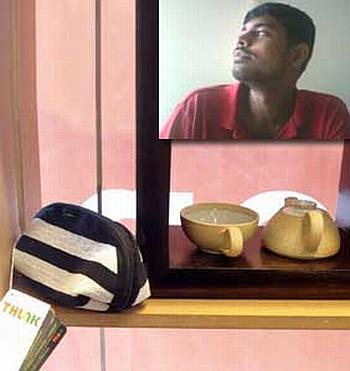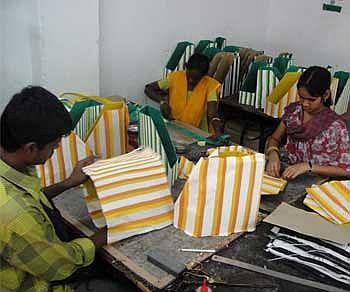
There's more to garbage than you think.
"For most people it's just about dumping their trash in a black polythene bag and leaving it outside their home," says 24-year-old Suren Vikhash U. But there's more that can be done and with a greater responsibility. And this enterprising youngster is shouldering that responsibility through his brainchild 'Thunk in India'.
The enterprise that was officially launched in January 2009 is going from strength to strength by creating funky, durable, useful products from, you guessed it: garbage.
"It started out when in my final year of studying product design at Shrishti School of Arts (Bengaluru). I interned with Daily Dump, an organisation that is spreading awareness of the benefits of composting -- turning household organic waste into useful manure or compost.
"Through my internship I studied the entire waste management process -- from the landfills to the rag pickers to the recycling units. I would visit landfills around Bengaluru, interact with the slum dwellers who made their living by sorting and collecting recyclable trash and the process by which this garbage was recycled into other products."

The big idea was to create a platform to bring together the various people and agencies involved in the waste management process in order to create a solution that was environment friendly yet income generating.
What evolved was his final year project where he created items that found use in everyday activities yet were made from reused waste -- packing cartons, plastic, bottles etc. Not only was his effort recognised for its innovation but individuals and products suppliers (shops and boutiques) showed commercial interest.
"My ideas were even recognised at the Pan IIT Innovation Awards," says Suren. The Rs 50,000 award was the seed capital that gave Thunk its wings.
"To make Thunk a success became a passion."
But it wasn't about making money. It was about reducing the carbon footprint of individuals and industries, while providing less-privileged classes with sustainable income.
"There are a lot of individuals in the waste management system: there are the rag pickers (or waste managers), the government, the recycling units etc. But they are pretty much working in isolation. I wanted to make it a collaboration," he says.
Landfills are a huge problem, so are the increasing amounts of waste that are generated by households, industries. "What we do is work with waste managers to sort through household, industrial and natural waste to collect items that are durable and upcycle these so as to utilise their long life and strength."
"We adopt a cradle to cradle design approach where waste is reused instead or recycled (which involves less environmentally friendly practices). The waste is processed and fabricated to improve durability. This is then used to make funky products like wallets, bags, penholders, CD cases, laptop bags and a whole range of other lifestyle products."

"Plastic for instance has a much longer life than for the amount of time it is used in a home. Tetrapaks too. Coconuts and other by-products have so many more uses but usually these are just burned, which is a huge waste," informs Suren.
"So we get involved. We buy reusable waste from waste managers, process it and design new, innovative, attractive products that people would want to buy, have on their desks, in their homes."
But Thunk does not stop at just buying the waste from waste managers.
"We also train them in weaving, tailoring -- we want to impart employable skills that will serve them in the long-term. We educate them on the importance of health insurance, saving schemes. If they are not working with us tomorrow, they still have skills that will serve them well. We also work with weavers (most of whom have lost their regular incomes due to recession) to create weaves out of various products."
This had a learning curve too. The weavers had a set method of working, and training them to create products by weaving different reprocessed materials was a challenge. "But from one loom we now have seven running looms, so it's orking quite well," says Suren.
There are currently 35 waste managers on board along with seven weavers and four on the design team.
But to sustain the enterprise there has to be a commercial upside as well. "We are doing quite well. We are close to breaking even." The Pan IIT Award and an additional Rs 2 lakh was the initial investment and sales have been substantial enough to cover production costs; however the investment in design and exploration of new processes is yet to be recovered.

The enterprise supplies to stores in seven cities at present across five states. To bolster its income, Thunk also manages waste for companies. This involves using the company's waste to create products that the company then buys as corporate gifts.
"When you hear of 'green products', it's either expensive or not very attractive. Most people buy them out of sympathy. We want people to buy our products to make a statement both about being green and about being stylish."
So how much do these funky, 'green' products retail for. "Our products begin at Rs 150 and go up to Rs 2,300 which is our laptop bag," informs Suren who has big plans for Thunk in India.
"We are looking at scaling up the business gradually. We're looking at adding five new outlets to our buyers' list every month and at creating new ranges of products too -- bigger, better products. We're currently looking at creating furniture out of auto waste."
So what does this social entrepreneur do when he's not steering the company's growth? "I'm an avid music composer," he shares. "But for now it's purely for pleasure."